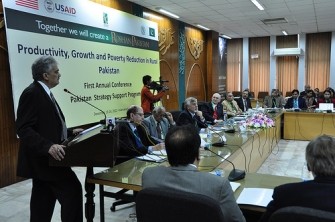
For Immediate Release
Islamabad, December 13, 2012 : The United States government launched today a two-day annual conference to review a range of policy issues to reduce rural poverty in Pakistan. The United States supports Pakistani researchers and the Government of Pakistan to make evidence-based policy reforms that address rural poverty. The Pakistan Strategy Support Program (PSSP) is a program of the United States Agency for International Development (USAID).
"The United States is proud to support the Planning Commission and so many outstanding Pakistani researchers who are committed to reducing poverty in Pakistan," said USAID Deputy Director Rodger Garner at the inaugural session of the conference. "These efforts will contribute to a stronger, brighter future for all Pakistan."
Dr. Nadeem ul Haque, Deputy Chairman of the Planning Commission, and other members of the Government of Pakistan, including Abdul Wajid Rana, Principal Officer and Secretary of Finance, are part of the committee that supervises PSSP.
"USAID assistance will enable Pakistan to modernize its policy formulation by improving research-based policy analysis. This will create a more favorable environment for investments and job growth,” said Dr. Nadeem ul Haque, Deputy Chairman, Planning Commission at the occasion.
PSSP is a four-year U.S.-funded initiative under the Pakistan Planning Commission's framework for economic growth implemented by the International Food Policy Research Institute (IFPRI). It is one of many initiatives that the United States and Pakistani partners carry out together to reduce poverty and increase incomes. For example, the United States and Pakistan are expanding irrigation by 200,000 acres to spur farming near the Gomal Zam and Satpara dams, and increasing the incomes of 250,000 farmers and female agricultural workers throughout the country with training and market networks to help them grow their businesses.







Comment
Make a general inquiry or suggest an improvement.